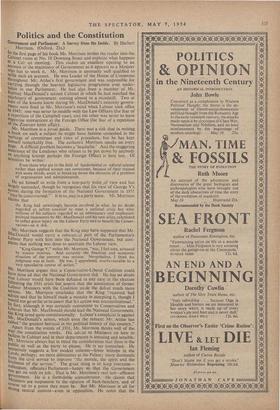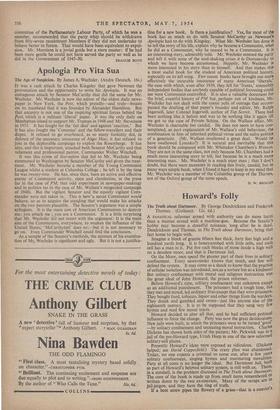Politics and the Constitution
overnment and Parliament: A Survey from the Inside. By Herbert Cabinet room at No. 10 Downing Street and explains what happens at a Cab let meeting. This makes an excellent opening to an account of the machinery of Government as it appears to a Minister Who has to work it. Mr. Morrison is unusually well qualified to Wilte such an account. He was Leader of the House of Commons throughout Mr. Attlee's first government and was responsible for carrying through the heaviest legislative programme ever under- taken in one Parliament. He had also been a member of Mr. Ramsay MacDonald's second Cabinet in which he had watched the Machinery of government coming almost to a standstill. Two at least of the lessons learnt during Mr. MacDonald's minority govern- Plents werefixed in Mr. Morrison's mind when Labour took office is 1945: one was never to meddle with the Law Officers (for fear of 11' repetition of the Campbell case), and the other was never to leave Imprecise instructions at the Foreign Office (for fear of a repetition Of the Zinoviev letter affair). Mr. Morrison is a jovial guide. There was a risk that in writing Et book on such a subject he might have become enmeshed in the Verbiage of committees and rules of procedure, but he has kept himself remarkably free. The authentic Morrison speaks on every Page. A difficult problem becomes a 'headache.' And the staggering assurance of the Londoner who refuses to be put down by anybody Or anything (except perhaps the Foreign Office) is here too. Of scientists he writes: Even those who are in the field of fundamental or natural science rather than applied science can sometimes, because of their trained and acute minds, assist in breaking down the elements of a problem of organisation and administration.
, He set himself to write from a non-party point .,of view and has largely succeeded, though he recognises that his view of George V's action during the formation of the National Government in 1931 PtaY be controversial." • It is so, and in a party sense. Mr. Morrison Claims that the King had unwittingly become involved in what he no doubt regarded as action essential to meet a national crisis but what millions of his subjects regarded as an unnecessary and unpleasant political manoeuvre by Mr. MacDonald and his new allies, calculated to inflict grave injury on the Labour Party and to benefit the Conser- vatives—as it did.
_Mr. Morrison suggests that the King may have supposed that Mr. MacDonald would carry a substantial part of the Parliamentary Labour Party with him into the National Government, but com- plains that nothing was done to ascertain the Labour view.
"King George V," writes Mr. Morrison, "was, I feel sure, actuated by sincere motives. And certainly the financial and economic situation of the country was serious. Nevertheless, I think his judgment was at fault. He was, I apprehend, overfavourable to a very speculative course of action." Mr. Morrison argues that a Conservative-Liberal Coalition could have done all that the National Government did. He has no doubt that t Labour would have been defeated in any case at the election M the 1931 crisis but asserts that the association of former Labour Ministers with the Coalition made the defuat much more serious. Mr. Morrison concludes that the King "received bad advice and that he himself made a mistake in accepting it, though I Would not go so far as to assert that his action was unconstitutional." !a fact, although it was certainly convenient to Conservatives and !iberals that Mr. MacDonald should lead the National Government, the King acted quite constitutionally. Labour's complaint is against 'Ir. MacDonald's action, which even the reticent Mr. Attlee has called "the greatest betrayal in the political history of this country." Apart from the events of 193.1, Mr. Morrison thinks well of the .vaY the constitution works.. His advice to Ministers on how to Mr. in Cabinet and in their departments is amusing and sensible. mr• Morrison always has in mind the consideration that there is the public as well as the party to please. He is no iconoclast. He tentatively suggests a few modest reforms—fewer bishops in the lieornds, perhaps; no more débutantes at the Palace; more dismissals Committee of the Parliamentary Labour Party, of which he was a member, recommended that the party whip should be withdrawn from fifty-seven recalcitrant Members if they did not undertake to behave better in future. That would have been equivalent to expul- sion. Mr. Morrison is a jovial guide but a stern master: if he had been more gentle he could not have served the party so well as he did in the Government of 1945-50. FRANCIS BOYD











































 Previous page
Previous page